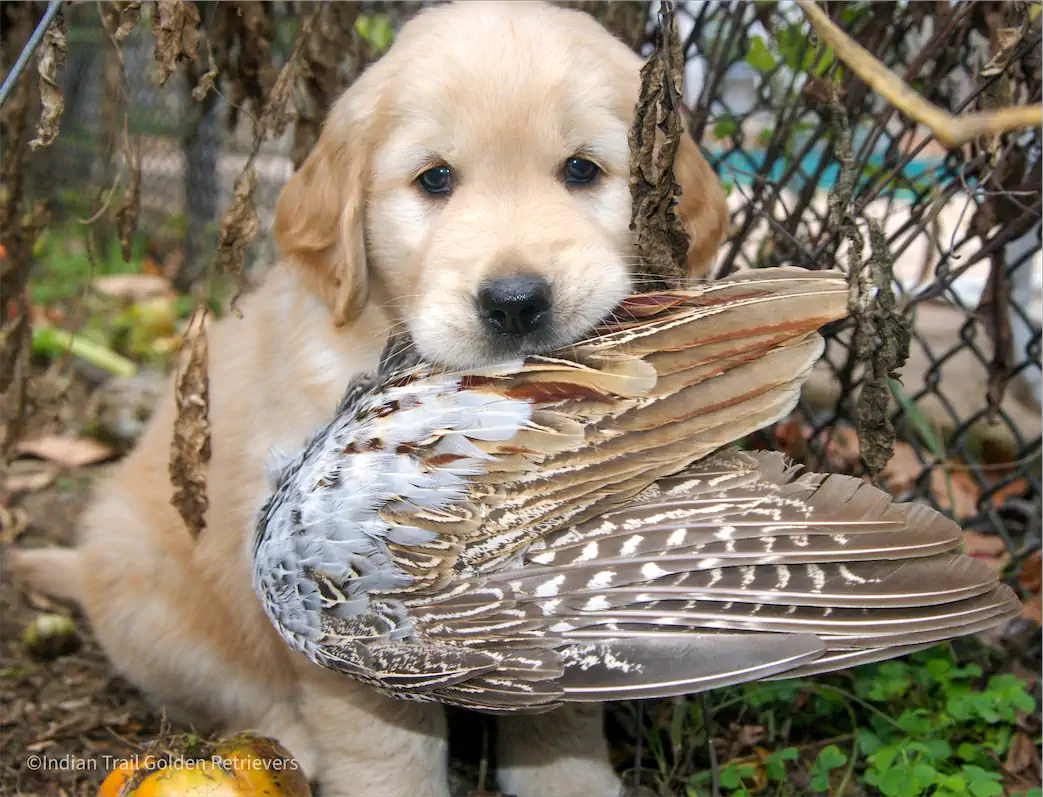How to choose the right food and eating schedule for my new Golden Retriever puppy?:
It's important to feed your golden retriever puppy a high-quality diet that is formulated for their specific age and size. Puppies have different nutritional needs than adult dogs, and it's important to meet those needs in order to support their growth and development.
In general, golden retriever puppies should be fed a diet that is high in protein and calories. Look for a puppy food that lists a high-quality source of protein, such as chicken or fish, as the first ingredient. It's also a good idea to choose a puppy food that is formulated for large breed dogs, as golden retrievers are a large breed.
As for how often to feed your puppy, it's generally recommended to feed them three to four times per day until they are around six months old. At that point, you can reduce the number of feedings to twice a day. It's important to follow the feeding recommendations on the back of the puppy food package, as the exact amount of food your puppy needs will depend on their age, weight, and activity level.
Legumes, such as beans, peas, lentils, and peanuts, can be a part of a dog's diet in VERY LOW moderation. Some legumes, such as kidney beans, can be toxic to dogs if ingested in large quantities. It is also important to keep in mind that legumes should not make up the majority of a dog's diet and should be fed in conjunction with a balanced diet that includes appropriate amounts of protein, fat, and carbohydrates. If you have concerns about feeding legumes to your dog or are unsure about the proper serving size, it is always best to consult with a veterinarian. There are many new studies that are pointing to a diet high in legumes as a major cause for heart failure in large breeds like Golden Retrievers. Research the work done by UC Davis at this link.
Check the ingredients on your dogs dry food bag and make sure legumes are either not present or are VERY minimal in content. This means that legumes should not be listed in the first five ingredients in your dog food.
It's also a good idea to stick to a consistent feeding schedule and to have a set place for your puppy to eat their meals. This can help to prevent them from developing any bad habits, such as begging for food or getting into the trash.
In general, golden retriever puppies should be fed a diet that is high in protein and calories. Look for a puppy food that lists a high-quality source of protein, such as chicken or fish, as the first ingredient. It's also a good idea to choose a puppy food that is formulated for large breed dogs, as golden retrievers are a large breed.
As for how often to feed your puppy, it's generally recommended to feed them three to four times per day until they are around six months old. At that point, you can reduce the number of feedings to twice a day. It's important to follow the feeding recommendations on the back of the puppy food package, as the exact amount of food your puppy needs will depend on their age, weight, and activity level.
Legumes, such as beans, peas, lentils, and peanuts, can be a part of a dog's diet in VERY LOW moderation. Some legumes, such as kidney beans, can be toxic to dogs if ingested in large quantities. It is also important to keep in mind that legumes should not make up the majority of a dog's diet and should be fed in conjunction with a balanced diet that includes appropriate amounts of protein, fat, and carbohydrates. If you have concerns about feeding legumes to your dog or are unsure about the proper serving size, it is always best to consult with a veterinarian. There are many new studies that are pointing to a diet high in legumes as a major cause for heart failure in large breeds like Golden Retrievers. Research the work done by UC Davis at this link.
Check the ingredients on your dogs dry food bag and make sure legumes are either not present or are VERY minimal in content. This means that legumes should not be listed in the first five ingredients in your dog food.
It's also a good idea to stick to a consistent feeding schedule and to have a set place for your puppy to eat their meals. This can help to prevent them from developing any bad habits, such as begging for food or getting into the trash.
To inquire about a puppy or if you have a question, please contact us here
Indian Trail Golden Retrievers ©2024

